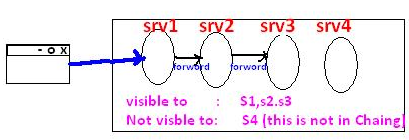Attributes
The servlet programmer can pass information from one servlet to another using attributes. It is just like passing object from one class to another so that we can reuse the same object again and again.
We have 3 types of scopes for attributes
-
Request scope
-
Session scope
-
Application scope (ServletContext Scope)
Attributes can be apply
-
if Both Source& Destination Servlets are in same/different web application
-
if Both Source& Destination Servlets are in same Server
-
It is not applicable if Both Source& Destination Servlets are in different Server
We have 3 methods to deal with attribues
-
public void setAttribute(String name,Object object
-
public Object getAttribute(String name)
-
public void removeAttribute(String name)
1. Request Attribute:
It applicable only if both servlets must be in CHAIN


public class srv1 extends HttpServlet {
public void doGet(HttpServletRequest req, HttpServletResponse res) throws ServletException, IOException {
req.setAttribute("uname", "ADMIN");
req.setAttribute("pwd", "123abc$");
RequestDispatcher rd = req.getRequestDispatcher("/s2");
rd.forward(req, res);
}
}
--------------------------------------
public class srv2 extends HttpServlet {
public void doGet(HttpServletRequest req, HttpServletResponse res) throws ServletException, IOException {
res.setContentType("text/html");
PrintWriter pw = res.getWriter();
pw.write("Username : "+req.getAttribute("uname"));
pw.write("Password : "+req.getAttribute("pwd"));
}
}
---------------------------------------
Output: Username: ADMIN Password : 123abc$
2.Session Attribute:
It applicable per one browser window at a time. I.e Session is maintain in single window


public class srv1 extends HttpServlet {
public void doGet(HttpServletRequest req, HttpServletResponse res) throws ServletException, IOException {
HttpSession sess = req.getSession();
sess.setAttribute("id", "10001");
sess.setAttribute("name", "Satya");
}
}
-------------------------------------------
public class srv2 extends HttpServlet {
public void doGet(HttpServletRequest req, HttpServletResponse res) throws ServletException, IOException {
res.setContentType("text/html");
PrintWriter pw = res.getWriter();
HttpSession sess = req.getSession();
pw.write("ID : "+sess.getAttribute("id"));
pw.write("<br>Name : "+sess.getAttribute("name"));
}
}
---------------------------------------------
Output ID : 10001 Name : Satya
3.Application /Context Attribute
-
It can applicable both servlets must be in Single Server
-
No need of Servlet Chaining & Session because it is per web application


public class srv1 extends HttpServlet {
public void doGet(HttpServletRequest req, HttpServletResponse res) throws ServletException, IOException {
ServletContext cxt= req.getServletContext();
cxt.setAttribute("name", "Johnny");
cxt.setAttribute("age", "26");
}
}
---------------------------------------
public class srv2 extends HttpServlet {
public void doGet(HttpServletRequest req, HttpServletResponse res) throws ServletException, IOException {
res.setContentType("text/html");
PrintWriter pw = res.getWriter();
ServletContext cxt= req.getServletContext();
pw.write("Name: "+cxt.getAttribute("name"));
pw.write("Age : "+cxt.getAttribute("age"));
}
}
------------------------------------------
Output: Name: Johnny Age : 26
Stateless Behaviour: is nothing but while processing current request in any web resource program is cannot use previous request data is nothing but Statteless here.
HTTP is a Stateless protocol that means each request is considered as the new request
To make our HttpServlet as a Stateful resource program we use Session Tracking